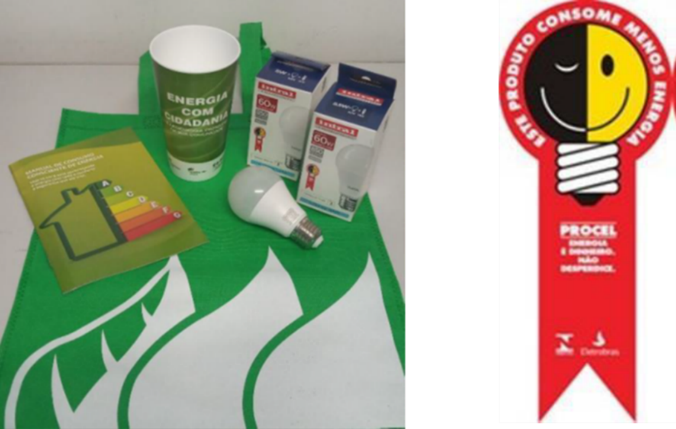Projects for Low-Income Communities
Energy with Citizenship
By means of mobile units, the projects take actions to change light bulbs, provide commercial services, give talks on the safe and rational use of electricity and provide services to public and/or welfare bodies and institutions. Partners in this action include city halls (NIS registration), the Bahia Public Prosecutor's Office (recognition of paternity and divorces), the Bahia Court of Justice (Justice Desk), among others.
*A resident of a low-income community is defined as a family living on a monthly income of up to half the minimum wage per person. Source: Federal Government.

 Energy with Citizenship Program:
Energy with Citizenship Program:
Selecione o seu município:
Selecione o seu município:
Selecione o seu município:
Selecione o seu município:
Selecione o seu município:
Criteria for participating in the light bulb exchange.
- Be a residential or rural-residential customer;
- Be a resident of a low-income community or be registered with the TSEE (Social Electricity Tariff);
- Have no debts with Neoenergia;
- Have a regular supply with Neoenergia;
- Have not changed light bulbs in Neoenergia projects in the last 6 years (maximum limit of 8 bulbs);
- Deliver the used incandescent, fluorescent or halogen bulbs (power equal to or greater than 14W).
Type of action:
Stationary: action with a trailer, it takes place mainly in central squares within the community. In this modality, customers come to our unit to be attended to.Mobile: using a small vehicle (fiorino/van) to serve the population "door to door", without leaving their homes.

Fixed service points:
Bahia:Itapuã Neighborhood City Hall: Av. Dorival Caymmi, No. 17 — Itapuã.
Cabula Neighborhood City Hall: Rua Silveira Martins, No. 185, Cabula.
Bairro Cidade Baixa City Hall: Rua Porto dos Mastros, No. 65 - Ribeira (in front of the Edgar Santos Library)
Cajazeiras Neighborhood City Hall: Av. Engineer Raymundo Carlos Nery, No. 413 - Cajazeiras (Cajazeiras Municipal Market)
Pau da Lima City Hall: Av. San Rafael No. 186, San Marcos.

Through mobile units, the projects bring to popular communities* actions to replace lamps, commercial service, lectures on the safe and rational use of electricity, and assistance to public and/or welfare agencies and institutions. Partners in this action are municipalities (NIS registration), the Bahia Public Prosecutor's Office (recognition of paternity and divorces), the Bahia Court of Justice (Balcão de Justiça), among others.
*A popular or low-income community is defined as neighborhoods with an average monthly income per capita of up to R$ 794.66, based on data from the 2010 IBGE Demographic Census.

- Be a residential or a rural-residential client;
- Be a resident of a popular community or be registered with the TSEE (Social Electricity Tariff);
- Do not have debts with Neoenergia;
- Have a regular supply with Neoenergia;
- Not having changed lamps in Neoenergia projects in the last 6 years (maximum limit of 8 lamps);
- Deliver used incandescent, fluorescent or halogen bulbs (power equal to or greater than 14W).
Stationary: action with a truck, occurs mainly in central squares within the community. In this modality, customers go to our mobile unit to be served.
Mobile: action with a small vehicle (Fiorino/van) to serve the population “door to door”, without leaving the residence.

Fixed Service Stations: action takes place permanently at fixed or partner points. In this modality, customers go to service points.
Click below to see the current schedule of mobile stations and also find out about the addresses of the fixed service centers.
Programming - Energy with citizenship (insert programming for the mobile stations of each distributor)
Bahia:
- Itapuã Neighborhood City Hall: Av. Dorival Caymmi, No. 17 — Itapuã.
- Cabula Neighborhood City Hall: Rua Silveira Martins, No. 185, Cabula.
- Bairro Cidade Baixa City Hall: Rua Porto dos Mastros, No. 65 - Ribeira (in front of the Edgar Santos Library)
- Cajazeiras Neighborhood City Hall: Av. Engineer Raymundo Carlos Nery, No. 413 - Cajazeiras (Cajazeiras Municipal Market
- )
- Pau da Lima City Hall: Av. San Rafael No. 186, San Marcos.
The project is carried out on an emergency basis to assist state and federal government Contingency Plans, benefiting low-income residential units, which, due to their social condition, have less financial resources to withstand the tragedies that occurred as a result of heavy rains. In this sense, the project replaces refrigerators damaged by floods and also makes the replacement of ordinary light bulbs with LEDs.
Solidarity Energy
The project is carried out on an emergency basis to help with the state and federal governments' Contingency Plans, benefiting low-income residential units, which due to their social condition have fewer financial resources to withstand the tragedies that occur as a result of heavy rainfall. In this sense, the project replaces refrigerators damaged by the floods and also exchanges ordinary light bulbs for LED ones.